El Salvador's recent award of a strategic derivatives license to Bitfinex marks a significant step in expanding its crypto hub vision. This move not only enhances the regulatory landscape but also showcases the country's commitment to financial innovation. With this license, Bitfinex can offer new trading tools and capitalize on the growing demand for crypto derivatives. You'll also notice that this development ties in with El Salvador's goal of improving financial inclusion and attracting foreign investment. If you want to explore the implications and future trends this creates, there's much more to uncover.
Key Takeaways
- El Salvador's regulatory framework allows for the issuance of strategic derivatives licenses, facilitating growth in the crypto market.
- Bitfinex's relocation to El Salvador enhances its operations, leveraging favorable regulations for crypto businesses.
- The DASP license acquired by Bitfinex enables expanded services, including token issuance and innovative financial products.
- The Digital Assets Securities Law fosters fintech innovation, positioning El Salvador as a global crypto financial hub.
- Enhanced regulatory clarity supports the growth of the crypto derivatives market, attracting more investment and participation.
Overview of the DASP License
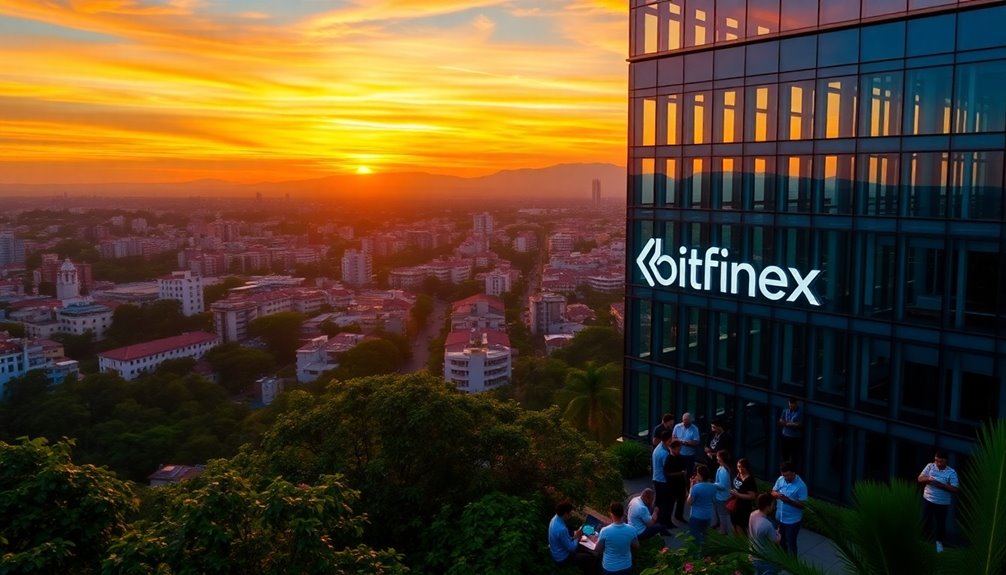
The DASP license, essential for companies looking to operate in El Salvador's burgeoning crypto market, requires that applicants meet specific criteria to ensure compliance and security. Only Salvadorian legal entities can obtain this license, which mandates a minimum of two shareholders and the appointment of key officers, including a Compliance Officer and a local director. The license covers various services, such as cryptocurrency trading, lending, and investment products. Regulatory oversight from the National Commission for Digital Assets guarantees adherence to compliance standards, risk management, and robust cybersecurity measures. To apply, you'll need to complete an application form, provide necessary attachments, and pay relevant fees, with a review period of 20 days following submission. Additionally, obtaining a DASP license promotes transparency and security within the crypto ecosystem.
Impact of Bitcoin Legalization

While many hoped Bitcoin legalization would transform El Salvador's economy, the reality has proved more complex. You might see the intentions behind the move: improving financial inclusion for the unbanked, making remittances cheaper and faster, and attracting foreign investment.
However, the initial outcomes have been mixed. Despite the Chivo Wallet's launch with incentives, most people prefer cash over Bitcoin, with 88% of firms quickly converting their holdings to dollars. Additionally, the government's Bitcoin price volatility has created fiscal risks that complicate its financial strategy. A growing number of investors are now considering Bitcoin IRA options to hedge against these fluctuations.
While transactions at Chivo ATMs are fee-free, external Bitcoin transactions can incur high fees. Additionally, the IMF's conditions now make Bitcoin acceptance voluntary, limiting its role in public finances.
As a result, the anticipated economic growth and stability remain uncertain amid these challenges.
Bitfinex's Relocation Strategy
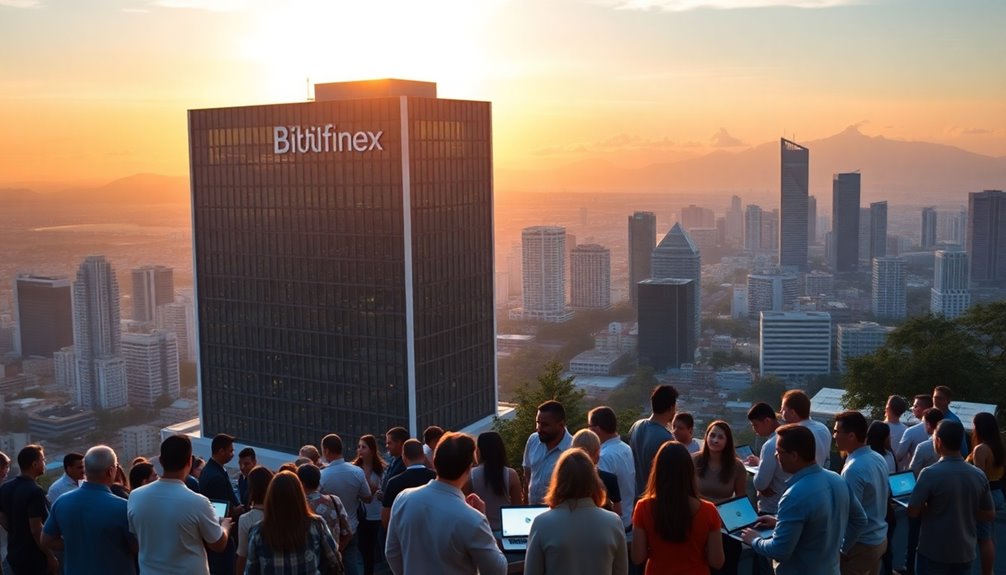
Bitfinex Derivatives has made a significant move by relocating from Seychelles to El Salvador, driven by the country's progressive crypto regulations and the acquisition of a Digital Asset Service Providers (DASP) license.
This strategic decision aligns with your mission to expand regional financial services. El Salvador's Digital Assets Securities Law, enacted in January 2023, supports fintech innovation and allows for streamlined fundraising procedures. Additionally, the country has been recognized as a global financial hub for cryptocurrency, further enhancing its appeal to crypto businesses. The regulatory compliance in El Salvador fosters an environment conducive to investment opportunities.
With the DASP license acquired in April 2023, you can now issue tokens and offer a wider range of financial services.
Despite past challenges, like the failed Hilton hotel tokenization project, your relocation demonstrates confidence in El Salvador's evolving regulatory landscape.
This move positions Bitfinex as a key player in a growing crypto-friendly environment.
Economic Benefits for El Salvador

As El Salvador embraces cryptocurrency, the economic benefits are becoming increasingly evident.
You'll notice that streamlined remittances using bitcoin cut traditional fees, leaving more disposable income for families. This boosts local consumption and invigorates economic activity, crucial since remittances make up over 20% of the GDP.
Foreign investment has surged, attracting crypto and blockchain businesses, while tourism flourishes, especially in crypto-friendly areas like El Zonte. Moreover, the government has laid the foundation for future growth and innovation in the financial sector, positioning El Salvador as a crypto-friendly environment.
Bitcoin City promises an influx of $1.6 billion due to its tax-free status.
Additionally, tax incentives and clear regulations create a favorable environment for crypto companies, enhancing profitability.
Enhancing Financial Inclusion
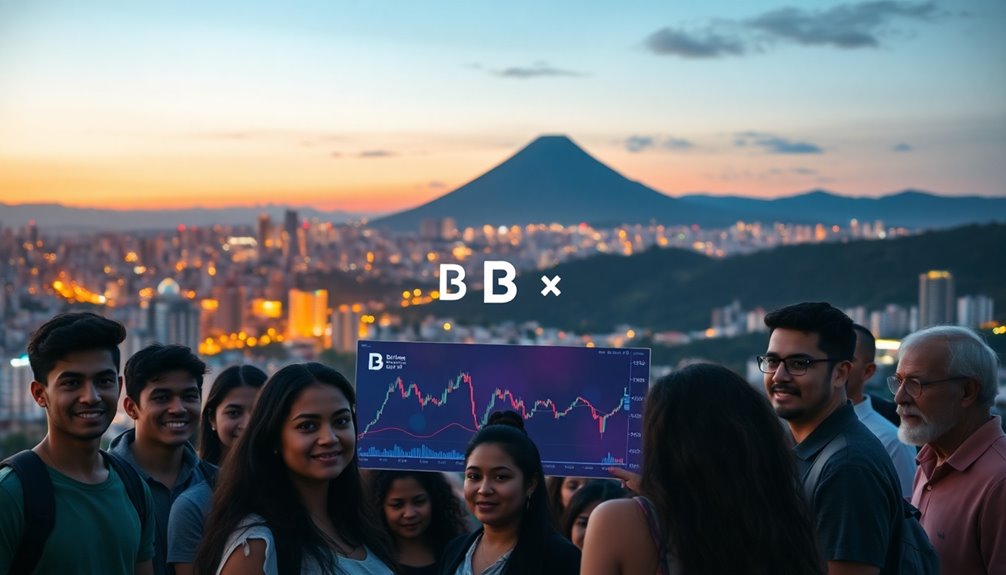
El Salvador's commitment to cryptocurrency isn't just about economic growth; it's also about enhancing financial inclusion for its citizens. The introduction of the Chivo wallet allows you to access bitcoin easily, even without a bank account. By offering $30 worth of bitcoin to each individual, the government encourages you to adopt this digital solution. The app facilitates seamless transactions and simplifies remittances from abroad, targeting the unbanked population. However, despite over half of households downloading the app, trust and technology issues hinder broader adoption. With 70% of households lacking bank accounts, digital platforms can transform the economy. El Salvador's Digital Assets Issuance Law aims to create a more favorable environment for digital asset adoption, addressing concerns about volatility and fostering user confidence will be vital for greater financial inclusion and long-term success.
Regulatory Framework Explained

While navigating the evolving landscape of cryptocurrency, you'll find that El Salvador has established a comprehensive regulatory framework to ensure the secure and responsible use of digital assets. The National Commission for Digital Assets (CNAD) oversees the digital assets market, while the Financial System Authority (SSF) enforces compliance with financial regulations, including AML and KYC policies. Key legislation like the Bitcoin Law and the Digital Asset Issuance Law outlines legal standards and operational procedures. Digital asset service providers (DASPs) must obtain licenses, meet capital thresholds, and adhere to strict reporting and cybersecurity requirements. This framework not only promotes transparency but also protects customer assets, ensuring a stable environment for innovation in the cryptocurrency space. The introduction of the Bitcoin Law has positioned El Salvador as a pioneer in cryptocurrency adoption, attracting global attention and discussions on regulation.
Industry Standards and Influence
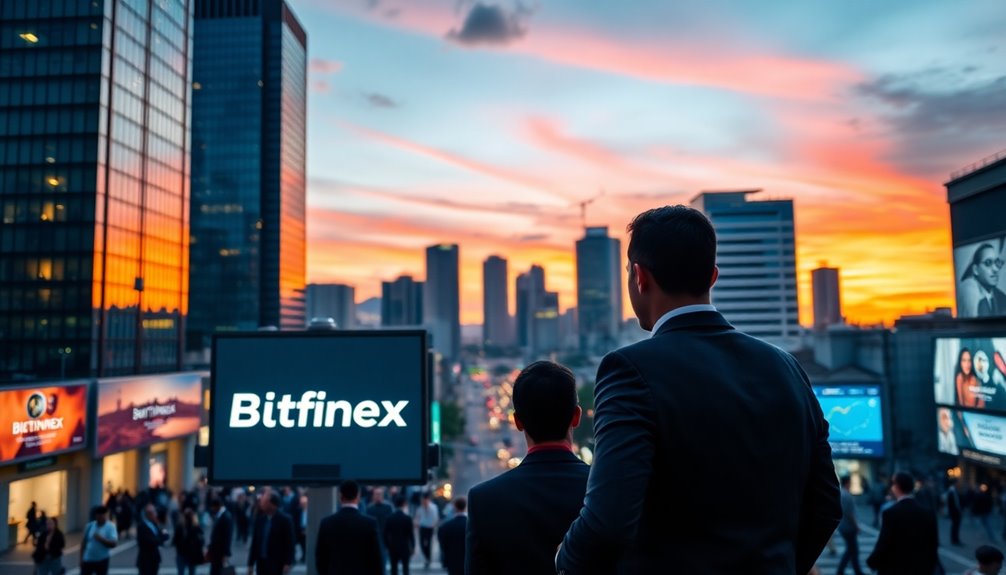
In an ever-evolving cryptocurrency landscape, industry standards play a crucial role in shaping security practices and fostering trust among users. The Cryptocurrency Security Standard (CCSS) enhances existing protocols like ISO 27001, ensuring organizations manage crypto securely. With three compliance levels, from basic cyber hygiene to advanced controls, it caters to various entities handling cryptocurrencies. Compliance with CCSS significantly reduces the risk of breaches and highlights the importance of robust security measures in the cryptocurrency ecosystem.
Innovative Derivatives Products

As the cryptocurrency market evolves, innovative derivatives products are gaining traction, offering traders new opportunities to manage risk and enhance returns. You can leverage AI and machine learning for dynamic margin optimization and advanced risk management, making your strategies more robust. The landscape is diversifying beyond traditional futures and options to include exotic derivatives and synthetic assets that mimic real-world performance. Decentralized platforms like dYdX and GMX are emerging, providing greater transparency and lower fees, which can significantly improve your trading experience. With regulatory clarity driving growth, you'll find more tools and products at your disposal. This evolution not only enhances market efficiency but also fosters inclusivity within the global trading ecosystem, allowing you to tap into new opportunities. Moreover, the crypto derivatives market is poised for unprecedented growth due to regulatory clarity, further enhancing the range of options available to traders.
Compliance Measures Required

To thrive in El Salvador's expanding crypto landscape, you must navigate a complex web of compliance measures.
First, register with the Central Reserve Bank (BCR) within 20 days of starting operations. You'll also need to register as a digital asset service provider with the National Commission on Digital Assets (CNAD) under the Digital Asset Issuance Law.
Implement strong anti-money laundering (AML) and know-your-customer (KYC) policies to verify customer identities and prevent illicit activities. Additionally, the legal tender status of Bitcoin since June 2021 enhances the need for robust compliance measures to build trust with customers.
Ensure you meet financial reporting requirements and maintain cybersecurity protocols to protect client assets.
Lastly, adhere to the oversight of the Financial System Authority (SSF) and remain aligned with government regulations to ensure transparency and legal compliance in your operations.
Future of Crypto in El Salvador
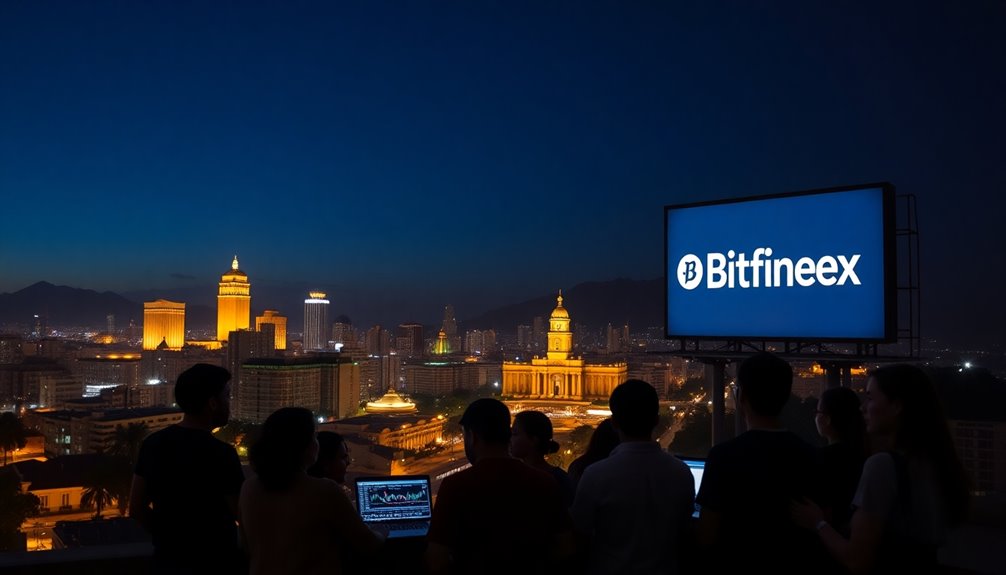
While the regulatory environment continues to evolve, the future of crypto in El Salvador looks promising for businesses and investors alike.
With the enactment of the Digital Assets Issuance Law and reforms set for 2024, clarity in regulations is enhancing the landscape for digital asset companies. Tax incentives exempting cryptocurrency businesses from various fees make the market even more attractive. The introduction of the DASP license is a significant step toward establishing a secure framework for companies operating in the digital asset space.
As firms like Bitfinex establish operations, the country positions itself as a regional crypto hub. The deployment of tools like the Chivo wallet and Bitcoin ATMs further facilitates adoption.
El Salvador's commitment to financial inclusion and regulatory compliance bodes well, setting a foundation for sustainable growth in the crypto sector, despite challenges that may arise.
Frequently Asked Questions
How Can Individuals Trade Derivatives on Bitfinex in El Salvador?
To trade derivatives on Bitfinex, you'll first need to create an account and complete the necessary verification.
After that, you can explore perpetual futures and other derivatives on various assets like Bitcoin and Ethereum.
You can also utilize up to 10x leverage through the peer-to-peer margin funding platform.
Be sure to monitor your leverage to avoid liquidation and take advantage of the advanced charting tools to enhance your trading strategy.
What Specific Derivatives Products Will Bitfinex Offer in El Salvador?
Bitfinex will offer several derivatives products in El Salvador, including perpetual futures with up to 100x leverage, allowing you to hold positions without expiry.
You'll also find full options trading, giving you the chance to buy or sell at predetermined prices.
Additionally, there'll be Bitcoin and crypto futures for managing price risk.
With advanced trading instruments like margin accounts, you'll enjoy enhanced flexibility and efficiency in your trading experience.
Are There Risks Associated With Trading Derivatives on Bitfinex?
Yes, there're several risks associated with trading derivatives on Bitfinex.
You face volatility, which can lead to rapid losses due to unpredictable price movements.
Counterparty risk is another concern, as platform outages or hacks could affect your trades.
High leverage can amplify both profits and losses, while liquidity issues may hinder your ability to execute trades at desirable prices.
Lastly, regulatory uncertainties can impact your trading experience and potential returns.
How Does El Salvador's Crypto Environment Compare to Other Countries?
El Salvador's crypto environment stands out due to its legal tender status for Bitcoin, which sets it apart from many countries that only allow limited use or have no specific regulations.
You'll find that while Brazil has developed a licensing regime, El Salvador offers unique tax incentives and a supportive infrastructure, like Bitcoin ATMs and wallets.
In contrast, countries like India and Colombia have uncertain regulatory landscapes, limiting their cryptocurrency adoption and use.
What Future Regulations Might Affect Crypto Trading in El Salvador?
Future regulations in El Salvador may focus on enhanced compliance and transparency in crypto trading.
You might see stricter anti-money laundering and customer protection measures, ensuring that digital asset service providers follow rigorous registration and reporting requirements.
Additionally, modifications in asset definitions could clarify the legal landscape, while the emphasis on transaction monitoring may affect your trading strategies.
Conclusion
In conclusion, El Salvador's decision to award Bitfinex a strategic derivatives license marks a significant step in establishing a robust crypto hub. This move not only enhances financial inclusion but also sets a precedent for industry standards. As innovative products emerge, the country's economy stands to benefit greatly. By embracing cryptocurrency, you're witnessing a bold transformation that positions El Salvador as a leader in the digital finance landscape, paving the way for a more inclusive financial future.









